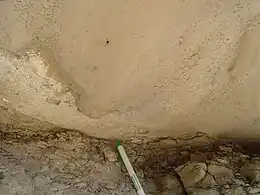Book Cliffs
The Book Cliffs are a series of desert mountains and cliffs in western Colorado and eastern Utah in the Western United States.[1] They are so named because the cliffs of Cretaceous sandstone that cap many of the south-facing buttes appear similar to a shelf of books.[2][1]



Stratigraphy

The Book Cliffs are one of the world's best places to study sequence stratigraphy. In the 1980s, Exxon scientists used the Cretaceous strata of the Book Cliffs to develop the science of sequence stratigraphy. The Book Cliffs have preserved excellent strata of the foreland basin of the ancient Western Interior Seaway that stretched north from the Gulf of Mexico to the Yukon in the Cretaceous Period. Components of deltaic and shallow marine reservoirs are very well preserved in the Book Cliffs.
Wildlife
There are many small streams that contain a variety of trout species.
Large mammals found in the Book Cliffs include coyotes, mountain lions, bobcats, mule deer, elk, black bears, pronghorn, American bison as an extension of the Henry Mountains bison herd and bighorn sheep. In January 2009, Utah Division of Wildlife Resources officials transplanted 31 bison from the Henry Mountains bison herd to the Book Cliffs.[3] The new group joined 14 animals previously released in August, 2008 from a private herd on the nearby Uintah and Ouray Indian Reservation.[4] This herd is approximately 100 miles (160 km) north of the Henry Mountains across mostly harsh, desert terrain.
References
- U.S. Geological Survey Geographic Names Information System: Book Cliffs
- Van Atta, Dale (Jan 22, 1977). "You name it - there's a town for it". The Deseret News. p. 15. Retrieved 18 October 2015 – via Google News.
- "DWR captures bison near Lake Powell". Utah Division of Wildlife Resources. Archived from the original on 2009-12-10.
- "Bison Return to the Book Cliffs". Utah Division of Wildlife Resources. Archived from the original on 2009-10-25.